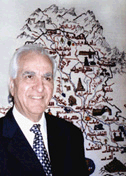Peace Tourism: The world’s nations are moving on its paths
Why Tourism?
Studies, conferences and exhibitions have dealt with tourism on different levels: economic, cultural, historical, social, or even that of peace, but I did not find a comprehensive study of the needs of the individual who spanned all the tourist groups, taking into account his personal experience. Maybe this is more of a consideration for social psychology than tourism, but a reflection on this subject shows a close relationship between the two.
Every human being is faced with various pressures at every stage of life. These are usually born of the interaction of the individual with his environment, when he interprets any warning as a threat or challenge. The pressure includes requirements that exceed the available resources.
It is difficult to classify all pressures but broadly they fall into three types. The first concerns physiological pressures, which result in immediate physical ailments. They are caused by wars, repression or torture for adopting a political position, or by natural disasters, pollution or disease.
The second relate to social pressures arising from adverse reactions vis-à-vis the other, at home, work (industrial relations), and school (academic relations). Even though a person spends a lot of time in these environments they are characterised by transient relationships. Examples here include social and class position, and the ambition of the individual to evolve culturally and economically and to improve his social situation.
Psychological pressures are the third kind. They are often the result of the first or second kind, or both, and are the most harmful because of their volatile nature and the urgency of their reactivity. They encompass all the feelings and emotions felt by human beings, such as love, hate, discouragement, failure, and even boredom, comfort and idleness. How can we escape from these pressures?
The pressures from different sources require human beings to adopt the appropriate means and methods to deal with them or to develop copping strategies. The strategy of handling pressure can be done through various means, such as a direct solution to the problem through balanced thinking, followed by appropriate decision-making. The help of others (social support) can also be sought. This can take several forms, such as physical and material assistance, or the guidance and providing of information, solidarity, or social contribution. It can also be handled by an evaluation method based on a redefinition of the situation and its perception anew. This can lead to a lessening of the degree of pressure or its aggravation. One of the other methods is to avoid the stressful situation in different ways, by running away from it, ignoring it, or suppressing it.
What interests me in this study, and what I theorize, is that tourism, travel and the change that accompanies them, are one of the sound options possible for the person under pressure. Certainly, this is one of the options of the strategies for dealing with pressure, which can allow the person to discover him or herself and to relax - especially for travellers coming from a reality that deprives them of the capacity to know themselves, and to seek peace and tranquillity.
The trip, with family and friends, plays a role in the strengthening of family relations between husband and his wife, parents and children, and vice versa. It is a crucial means to mitigate or eliminate social pressures, in one of the most fundamental environments, the home environment.
Mass tourism provides a unique pleasure. All the passengers involved aim to achieve the goals they have set. It reflects the theory of collective behaviour, or the psychology of the masses, and its various versions; this is positive, in so far as it has a precision in the organization and is associated with noble means and purposes.
As long as these conditions are met we can ensure that the collective behaviour of the masses does not deviate from its goals and does not turn into anarchy and violent acts. On the contrary, the social interaction of these individuals leads to the intellectual and spiritual cohesion of the masses. Among its positive effects, is the development of confidence of people in themselves, the consolidation of their sense of belonging to the group, the positive interaction to cope with social isolation, one of the most dangerous factors causing psychological distress among persons deprived of participation in social activities. Social change can result from joint efforts.
Finally there is the philosophy of persuasion, in determining the objective conditions pushing to change orientation, belief and behaviour. Thus, the group assumes the role of the persuader, the transmitter of the noble message and goal, as well as the correct path.
Here comes the option, which could reach a level of contradiction, between one person and another, in the choice of a type of tourism for leisure or psychological calm. Thus, there are those who will choose leisure with its various types and ethical levels. Others are going to see theatre or sport, or discover the civilization of nations and the course of history through centuries and generations. Some will seek places of prayer, and still others will look for places of rest and relaxation.
If we want to find a common purpose or goal for all tourists, we can only say that it is peace, which provides for the person under stress relaxation, tranquillity and security. This leads to other questions: What kind of tourism can human beings have to achieve peace and tranquillity with themselves and with others? What kind of tourism is the most buoyant and expressive of this noble goal, as well as the most efficient and fastest way to achieve it? Which of these tourist routes is possible, economically, for the individual? All these elements affect tourists and their psychological state, from a subjective point of view.
But there is another point of view, much is more important, in terms of impact and performance, which relates to the acceptance of this common goal for the majority of tourists, namely achieving tranquillity, rest, security and peace with the self, peace and reconciliation with others, and the dissemination of the principles of tolerance among different civilizations and cultures. This goal exceeds the tourist and what he feels. It affects the network of global tourism and its organizations active at the international level, as well as tourism strategy for its implementation at the national level and the degree of maturity to overcome the material aspects to attainment of the noble aims and objectives whose fruit can come later.
The best kind of tourism, in our view, which enables the individual to achieve security, safety, peace and tranquillity, is religious tourism. This does not mean that other genres have a lesser value, but the faith and conviction of tourists performing the rites and rituals, collectively, reinforces that feeling.
Given the importance of collective religious tourism, in achieving peace in the world, we will address this subject fully in our next issue. Here, we will shed light on other types of tourism, that could provide individuals, groups and peoples their innate need to recover and consolidate peace and internal stability of the self with itself and with others, and to alleviate the pressures of life.
I have dealt with various types of tourism in previous articles in ITM magazine, such as: Cultural Tourism (No. 2 and 24), School Tourism (No. 4), Medical Tourism (No. 5), River Tourism (No. 8), Residence Tourism (No. 21), Space Tourism (No. 31), tourism for people with limited incomes (No. 32) and Religious Tourism (No. 33).
I think that all these articles reflect various aspects, and each one represents an indispensable link in the chain of tourism for peace. Therefore, I decided to compile them in a book: Islamic Prospects for Tourism: Towards World Peace.
The tourism of peace can be achieved by marches, sports activities with charitable and noble objectives beyond states borders. It can come as a result of individual or collective initiatives for the spread of peace throughout the world. For example last year's march of Women for Peace hosted by Syria and organised by the International Movement "Follow the Women". This march, which used bicycles, started from the University of Aleppo, in northern Syria, to the historic Samaan Fortress, passing through other countries and cities, such as Lebanon and Palestine before arriving in the Jordanian capital Amman. The journey took 12 days, with hundreds of participants from 30 countries, headed by internationally renowned personalities, such as the founder of the British Association "Women for Peace" Detta Reagan, who was honoured with the title of "Woman of Europe" and was nominated for the Nobel Peace Prize.
This event has consolidated the exchange of views, cultural exchange between different nations through peaceful means and a spirit of sportsmanship and highlighted the need for peace and security in the region, while collecting donations for the benefit of women and children in the Middle East. Similarly, the women were able to enjoy themselves discovering, through cycling, different countries, and express how they felt about the message of peace to the world.
Another example of this kind of tourism is the annual Bikeathon in London, which has hundreds of participants of various age groups and fitness levels, all united in a single noble purpose: raising funds for the benefit of a charity for serious diseases. Last year this event was able to raise £ 200,000.
I am one of the staunchest advocates of this kind of sports tourism: bicycles have moderate speed, and benefits for physical and psychological health. They are cheap compared to other means of transport, flexible and ideal for use in the narrow streets of ancient cities. For these reasons and others, cycling can play an important role in tourism and the discovery of sites and countries.
In the next issue, I will discuss the route of the Father of Prophets, Abraham, as well as the march of the prophets and saints whose steps were followed by humanity.
Fellow travellers on the roads of peace, continue your march and God bless you.
A. S. Shakiry
|

